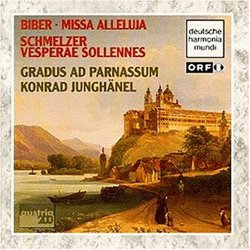| All Artists: Gradus ad Parnassum, Choralschola der Weiner Hofburgkapelle Title: Biber: Missa Alleluja * Schmelzer: Vesperae Sollennes /Gradus ad Parnassum * Junghanel Members Wishing: 0 Total Copies: 0 Label: Deutsche Harmonia Mundi / BMG Release Date: 3/14/1995 Genres: Special Interest, Classical Styles: Opera & Classical Vocal, Chamber Music, Forms & Genres, Fantasies, Historical Periods, Baroque (c.1600-1750), Sacred & Religious Number of Discs: 1 SwapaCD Credits: 1 UPC: 054727732621 |
Search - Gradus ad Parnassum, Choralschola der Weiner Hofburgkapelle :: Biber: Missa Alleluja * Schmelzer: Vesperae Sollennes /Gradus ad Parnassum * Junghanel
 | Gradus ad Parnassum, Choralschola der Weiner Hofburgkapelle Biber: Missa Alleluja * Schmelzer: Vesperae Sollennes /Gradus ad Parnassum * Junghanel Genres: Special Interest, Classical |
Larger Image |
CD Details |
CD ReviewsBeautifully performed, beautiful sound Steven Guy | Croydon, South Australia | 02/09/2007 (5 out of 5 stars) "I have copies of the original parts for the "Missa Allelujah à 36 voci" and the "Vesperæ sollennes", so I bought this recording with great interest some years ago. I was not disappointed. The works are performed with great style and I very much like the cathedral acoustical environment used for this recording. Cornetti, sackbuts, clarini, Baroque strings and organs all sound much better together when heard in a cathedral.
The voices and instruments blend beautifully, of course, and Biber and Schmelzer cause me to lament the introduction of transverse flutes, oboes and bassoons into Northern European ensembles very late in the 17th century. The sound of cornetts, trombones, trumpets, strings and dulcian was special and very refined. A number of instrumental works are performed on this CD, the Schmelzer sonata for 2 clarini, 2 cornettini and 3 trombones is particularly beautiful. Some plain chant and some other vocal works appear here, too. Gradus Ad Parnassum seems to be something of a "put-together" ensemble, consisting of a number of soloists and musicians from other ensembles. Concerto Palatino is given credit for providing the cornettists and trombonists. The recording was made at Chor-ton (Kornett-ton] pitch, circa a' = 466 Hz (a semitone higher than modern concert pitch, a' = 440 Hz), and this results in very bright sounds from the cornetti and brass and quite pungent sounds from the strings. The Mass by Heinrich Ignaz Franz von Biber is glorious, of course, and makes much use of polychoral affects and effects. Yet, Biber makes the music much more interesting by bringing the music down to very intimate levels at times. The Vesperæ by Johann Heinrich Schmelzer is a fine work and one of the few choral works by this composer available on CD. This recording should be considered by a wide range of music lovers - it represents the acme of 17th century Northern European sacred music." |
